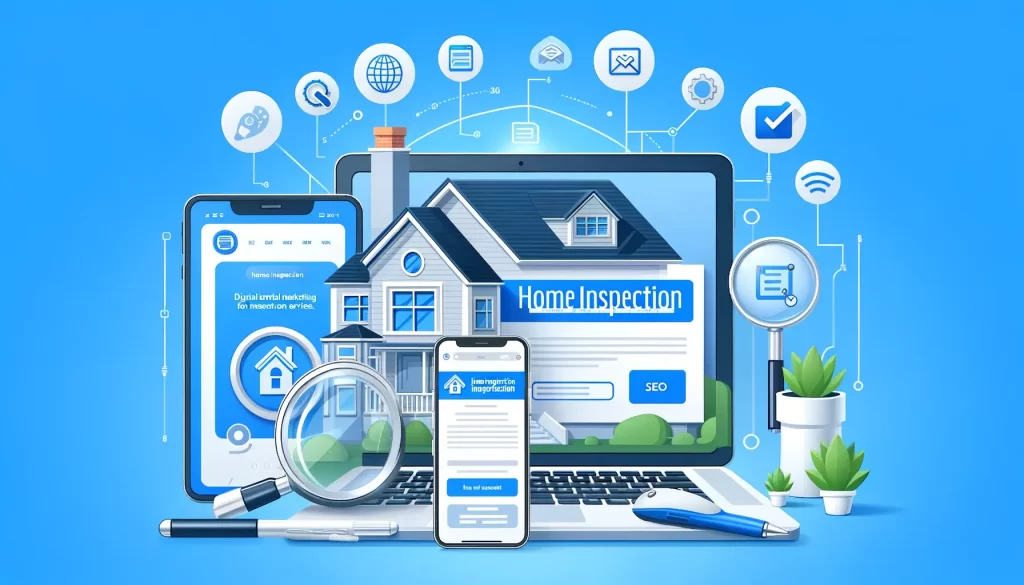Radon testing provides a vital service, protecting families from a serious health risk. However, in a competitive market, how do you ensure your radon testing business stands out online? SEO (Search Engine Optimization) is your key to increased visibility, more leads, and establishing your company as the go-to radon mitigation experts. Are you ready to transform your online presence? This guide will illuminate the path to radon SEO success.
Contents
Keyword Research for Radon Testing Specialists
Understanding Search Intent
- Put Yourself in the Client’s Shoes: People aren’t usually searching for “SEO for radon companies” – they’re looking for radon testing services directly. Your SEO needs to align with that.
- Think Like a Worried Homeowner: What triggers someone to search for radon testing? (Potential home purchase, health concerns, state requirements)
Keyword Research Tools
- Google Keyword Planner: https://ads.google.com/home/tools/keyword-planner/] Get search volume and related keyword ideas.
- Answer the Public: https://answerthepublic.com/] Provides question-based searches people ask about radon.
- Also Asked: https://alsoasked.com/] Reveals a chain of related questions people search for around a topic.
Keyword Brainstorming
- Location-Specific: “[City] radon testing,” “[State] radon inspection,” “radon testing near me”
- Problem-Focused: “How much does radon testing cost,” “signs of radon in home,” “how to fix high radon levels”
- Service Variations: “radon testing for new construction,” “pre-sale radon testing”
Important Considerations
Analyze Competitors: See what keywords their websites are ranking for.
Long-Tail Keywords: These are more specific, often lower competition, and may signal a higher intent to book (e.g., “licensed radon testing company [city]”).
On-Page Optimization Strategies
1. Title Tags & Meta Descriptions:
- Include Target Keywords: “Radon Testing in [City] | Accurate & Affordable | [Your Company]” (title tag).
- Compelling Call to Action “Protect your family from radon. Get a free quote today!” (meta description).
2. Header Tags (H1, H2, etc.)
- Clear Hierarchy: Your main H1 should include your primary keyword “Radon Testing Services in [Location].” Subheaders (H2, H3) should use related keywords.
- Make Them User-Friendly: Headers should also guide the reader through your content.
3. Optimize Your Content
- Natural Keyword Use: Don’t force it! Include “radon testing,” locations you serve, and related terms organically throughout your text.
- Answer User Questions: “Is radon testing necessary?” “What does a radon inspection include?”
- Don’t Neglect Image Alt-Text: Describe images in a way that includes relevant keywords (e.g., “radon testing specialist installing mitigation system”).
4. Internal Linking
- Contextual Links: Link from a blog post about radon health effects to your service page.
- Anchor Text: Use keyword-rich phrases as the clickable text of your links, not just “click here.”
Additional Tips
Website Speed: Fast-loading pages are crucial. Test with Google PageSpeed Insights https://developers.google.com/speed/pagespeed/insights/] and take steps to improve if needed.
Mobile-Friendliness: Your site must work flawlessly on phones. Use Google’s Mobile-Friendly Test https://search.google.com/test/mobile-friendly].
Example: Optimizing a Service Page
Let’s imagine you have a page titled “Radon Testing Services.” We could optimize it by:
- Refining the Title Tag: “Radon Testing in [City, State] | Certified Professionals”
- Adding an H2: “Why Choose Us for Radon Testing?”
- Content: Include a paragraph about your certifications, experience, and commitment to customer service.
You may aslo like: Plumber SEO Guide
Local SEO: Dominating in Your Area
Google Business Profile (GBP):
- Claim and Verify: If you haven’t already, claim your Google Business Profile (https://www.google.com/business/).
- Accurate Information: Ensure your business name, address, phone number (NAP), website, hours, service areas, and categories are correct.
- Optimize Your Description: Include keywords like “radon testing” and your service locations.
- Photos: Add high-quality images of your team, equipment, and completed projects.
Local Citations & Directories
- Consistency is Key: Make sure your NAP information is identical across all listings.
- Canadian Directories: Focus on sites like Yelp Canada, Yellow Pages Canada, as well as any local or industry-specific directories.
- Niche Sites: Are there any directories specifically for home inspectors or radon professionals in Canada?
Encourage Reviews
- Positive Reviews Matter: Ask satisfied clients to leave reviews on your GBP and other platforms. Respond to reviews professionally, even negative ones.
- Highlight on Website: Feature positive testimonials prominently on your website.
Optimize for “Near Me” Searches
- Mobile Optimization: Since many “near me” searches are done on smartphones, ensure your website is mobile-friendly.
- Location in Content: Naturally mention cities and towns you serve throughout your website’s pages.
Additional Tip
Use a tool like Moz Local https://moz.com/local or BrightLocal https://www.brightlocal.com/ to manage listings and track your local rankings.
Building Authority with Content
Types of Content to Create:
- Blog Posts:
- “Radon Levels in [ Ontario Region (Your Reigon Here) ]: Are You at Risk?”
- “DIY Radon Testing vs. Professional: Pros and Cons”
- “Understanding Your Radon Test Results: What to Do Next”
- Informative Pages:
- “The Radon Mitigation Process: A Step-by-Step Guide”
- “Frequently Asked Questions About Radon”
- Case Studies (If Possible): Showcase successful radon mitigation projects you’ve completed (before/after photos are a bonus).
- Video Content: Explainer videos about radon testing or mitigation processes perform well on social media.
Content Optimization Tips
- Keyword Inclusion: Don’t overstuff, but naturally weave in keywords we identified earlier.
- Shareability: Make your content valuable so people want to share it on social media.
- Internal Linking: Link between your content pieces to boost dwell time on your site.
- Calls to Action: Include clear prompts like “Request a free radon testing quote” within your content.
Beyond Your Website
- Guest Posting: Write for reputable blogs in the home improvement or health sectors, linking back to your site.
- Local Outreach: Can you partner with local real estate agents to offer radon info to their clients or write for a community newspaper?
Important Note
Focus on providing genuine value and addressing the concerns of homeowners in Ontario.
Off-Page Strategies (Link Building)
1. Quality Over Quantity
A few high-quality backlinks are more potent than numerous low-quality ones. Focus on:
- Relevance: Aim for links from sites in home improvement, health, or local Ontario websites.
- Authority: Links from established websites with good reputations carry more weight.
2. Link Building Tactics
- Local Resources Page: Reach out to your city’s website or local chamber of commerce to potentially get listed on a resource page.
- Directories: Beyond citations, some directories allow more in-depth profiles with a backlink to your site.
- Guest Posting: Offer to write high-quality articles for relevant blogs in exchange for a link back to your website.
- Broken Link Building: Find broken links (outdated or non-functioning) on relevant websites and suggest your content as a replacement.
3. Leverage Relationships
- Partners: Do you work with realtors, home inspectors, or other related businesses? Ask if they’d link to your site on theirs.
- Charities: If you support any local charities, they might include a link on their website.
- Suppliers: If you have equipment suppliers, see if they have a “Find an Installer” area where they could feature you.
Ethical Note:
Avoid buying links or participating in spammy link-exchange schemes, as this can hurt your rankings.
Measuring Your Radon SEO Success
Key Tools:
- Google Analytics: This free tool reveals tons of insights, including:
- Website Traffic: See if you’re getting more visitors over time and where they come from.
- Organic Search Traffic: Monitor how many people find you directly through search engines.
- Keywords: Discover which search terms people use to land on your website.
- Google Search Console: Provides valuable data directly from Google:
- Average Position: Tracks where your pages rank for different keywords.
- Clicks & Impressions: Shows how often people see your website in search results and how often they click through.
- Local Ranking Trackers: Tools like Moz Local or BrightLocal help monitor visibility in Google Maps results.
What to Track:
- Rankings for Target Keywords: Are you moving up in results for searches like “radon testing [your city]”?
- Traffic Growth: Is overall traffic increasing, especially from organic search?
- Conversions: Are more website visitors filling out your contact form or calling you for radon testing services?
Additional Considerations
- Set Benchmarks: Before you implement changes, record your starting point on different metrics so you can track improvement.
- Patience is Key: SEO doesn’t produce overnight results. Track progress consistently over months.
- Adapt and Experiment: Use the data to pinpoint strategies that are working well so you can double down on them.
FAQs
SEO helps you get found online by potential customers actively searching for radon-related services in your area. This leads to more website traffic and, ultimately, more business.
SEO is not a quick fix. It can take several months to see significant improvements, but with consistent effort, the results are well worth it.
You can learn the basics and implement some strategies. However, for best results, consider partnering with an SEO specialist who understands the radon industry.
SEO focuses on “organic” search results, meaning you don’t pay per click. PPC involves placing ads that you pay for when someone clicks. Both can be effective tools in your marketing strategy.
Tools like Google Analytics and Google Search Console provide insights into website traffic, search rankings, and how people find your site.


